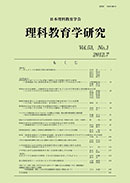Volume 48, Issue 3
Displaying 1-9 of 9 articles from this issue
- |<
- <
- 1
- >
- >|
Original Papers
-
2008 Volume 48 Issue 3 Pages 1-11
Published: March 19, 2008
Released on J-STAGE: June 30, 2022
Download PDF (1415K) -
2008 Volume 48 Issue 3 Pages 13-23
Published: March 19, 2008
Released on J-STAGE: June 30, 2022
Download PDF (1407K) -
2008 Volume 48 Issue 3 Pages 25-34
Published: March 19, 2008
Released on J-STAGE: June 30, 2022
Download PDF (1313K) -
2008 Volume 48 Issue 3 Pages 35-44
Published: March 19, 2008
Released on J-STAGE: June 30, 2022
Download PDF (1252K) -
2008 Volume 48 Issue 3 Pages 45-56
Published: March 19, 2008
Released on J-STAGE: June 30, 2022
Download PDF (1234K) -
2008 Volume 48 Issue 3 Pages 57-66
Published: March 19, 2008
Released on J-STAGE: June 30, 2022
Download PDF (1148K) -
2008 Volume 48 Issue 3 Pages 67-74
Published: March 19, 2008
Released on J-STAGE: June 30, 2022
Download PDF (1796K) -
2008 Volume 48 Issue 3 Pages 75-84
Published: March 19, 2008
Released on J-STAGE: June 30, 2022
Download PDF (1451K) -
2008 Volume 48 Issue 3 Pages 85-96
Published: March 19, 2008
Released on J-STAGE: June 30, 2022
Download PDF (1348K)
- |<
- <
- 1
- >
- >|
